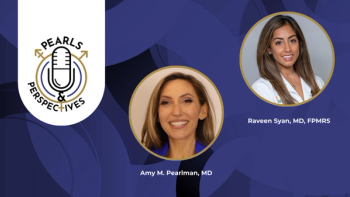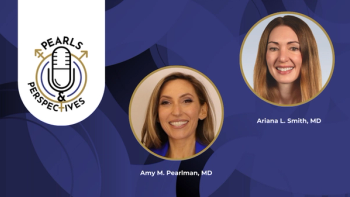
White paper addresses ethical considerations for older patients with incontinence

"As a committee, we felt that there was a need to put together a document to help field some of the ethical considerations that we run into in clinical care but have very little guidance on," says Anne M. Suskind, MD, MS, FACS, FPMRS.
In a new white paper issued by the International Incontinence Society (ICS), committee chair Anne M. Suskind, MD, MS, FACS, FPMRS, and co-authors provide health care professionals with a guide to handle ethical considerations concerning older patients with urinary incontinence.1
Suskind is an associate professor of urology and obstetrics, gynecology, and reproductive sciences, and chief of neurourology and female pelvic medicine & reconstructive surgery at the University of California, San Francisco.
Please discuss the background behind this white paper.
The idea for this white paper came out of the International Continence Society, or ICS, Ethics Committee, which I chair. As a committee, we felt that there was a need to put together a document to help field some of the ethical considerations that we run into in clinical care but have very little guidance on.
What are some examples of ethical considerations in older adults with urinary incontinence?
Some examples of questions that we thought needed a little bit of guidance, and ones that we address in the document, are how to best deliver care that reflects the dignity of the individual, how to manage incontinence in an individual with dementia who may not be able to express their own preferences and values, how, or if at all, should age be factored into treatment goals and plans, and what can we look at in addition to or separate from age that might be more helpful?
What are some of the key points in the white paper that are important for clinicians to know?
I'll start by saying what the white paper is and what the white paper is not. It is a document to help guide some of the ethical considerations and dilemmas that come up in the context of taking care of these vulnerable populations. We really wanted to take into account various perspectives, including that of the patient, the caregiver, and different types of health care professionals, not only urologists and other doctors, but also nurses, caregivers, and care aides.We also recognize that family members often play a pivotal role in providing this type of care, as a lot of this care is being given in people's homes, by their own families. Additionally, we acknowledge that a lot of these ethical dilemmas are extremely context-bound, so we do not attempt to provide any definitive solutions to problems, but rather we intend to review the context, including various cultural considerations, that are important, and ultimately, we want this document to be used as a starting point to raise awareness around some of these issues, and to help guide conversations and care from there.
We centered our white paper in a couple of contextual frameworks. One of them is the Four Principles of Health Care Ethics. This is one that many doctors are probably very familiar with, which includes the four pillars of non-maleficence, justice, autonomy, and beneficence. We also drew from a less-known ethical framework called the Ethics of Care Model. This is more popular in the social science literature, and is based on interpersonal relationships. At the core of this framework is compassion, sympathy, empathy, and sincere concern for others. These frameworks were a driving force in conceptualizing the document that we put together.
I can list the 6 guiding principles that we came up with from our group of experts, and for these, of course, we go into great detail in the document itself. Here's a sneak preview. One: “Health systems should create environments that support ethical continence care.” We really delve into the different levels of socio-economic structures for this. The first is the macro-level of structures, which includes health systems, policies, laws, etc..The second is the meso-level, which includes the institutional context. That’s the environment that the care is being given in, whether it be in the hospital, clinic, or home. And finally we discuss the micro-level of structures, which are the interpersonal contexts of care, including resources and time that are allotted to give this care.
Two is, “All older adults should be treated with dignity.” That's really a cornerstone of our document and it's nice to be able to highlight that in this kind of piece.
Three is, “The health care team should elicit the patient's own goals of care,” and this gets a little bit more in detail on one of the questions that I posed at the beginning, which is, what do you do when someone can't express their own wishes?
Four is, “Advanced communication should be employed in intimate continence care interactions with older adults.” This gets a little bit more into the ethics surrounding the caregiver’s perspective—provides some tips and tricks—to help to promote both the dignity of care provided and to ensure that the caregivers are safe in these sometimes challenging situations.
Five is “Treatment should be aligned with goals of care,” and 6, “The health care team should consider the potential burden of treatment that they recommend in the setting of multimorbidity, frailty, physical and cognitive impairments.”
Reference
1. Suskind AM, Vaittinen D, Gibson W, et al. International Continence Society white paper on ethical considerations in older adults with urinary incontinence. Neurourol Urodyn. Published online September 23, 2021. doi:10.1002/nau.24795
Newsletter
Stay current with the latest urology news and practice-changing insights — sign up now for the essential updates every urologist needs.





